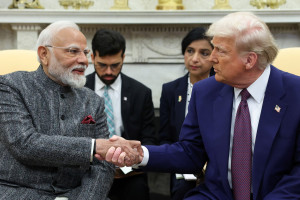World
Women must be treated as human beings, not commodities, says UN
The politicians are meeting in Sweden this week to discuss progress towards agreements made at the 1994 International Conference on Population and Development (ICPD).
The Guardian
Women and girls are not commodities and must be treated as human beings with equal rights to men, politicians from across the world who are gathered at a conference in Stockholm heard on Wednesday.
Babatunde Osotimehin, the executive director of the UN population fund, UNFPA, told delegates at the international parliamentarians' conference that they had a duty to raise the status of women in their countries and to remind their heads of state of the commitments they made to improve the lives of women and girls.
The politicians are meeting in Sweden this week to discuss progress towards agreements made at the 1994 International Conference on Population and Development (ICPD).
"We say girls, you are old enough to be married and old enough to have sex and old enough to have children, but you are not old enough to have access to contraception, not old enough to have sexuality education, not old enough to have control of your own body. This simply does not make sense," Osotimehin said.
"It all goes back to the status of women. We must not treat women and girls as commodities. They are human beings with rights and privileges."
The ICPD conference, held in Cairo in September 1994, is considered amilestone moment in the fight for women's rights. For the first time, it put women's empowerment centre stage in efforts to address population growth and sustainable development. The document emanating from the conference – the Cairo agreement – made more than 200 recommendations that sought to give women social and economic empowerment.
Baroness Jenny Tonge, president of the European Parliamentary Forum on Population and Development (EPF), said the Cairo agreement was akin to a "Copernicus revolution". In the same way Copernicus discovered that the Earth revolves around the sun, politicians at Cairo discovered that sustainable development revolves around an individual and their access to sexual health services.
"If we think [in terms] of Copernicus, all over the world, delegates have recognised that sexual and reproductive health and family planning for individuals is good for basic wellbeing, it stabilises population growth, increases social and economic growth and that leads to sustainable development," she told almost 250 delegates gathered at the Swedish parliament. "He [Copernicus] stuck to his guns when he came under fire for it, and he was right."
Over the past 12 years, politicians have met six times to discuss experiences and share ideas for implementing the Cairo agreement, and explore ways to fulfil the glaring gaps in progress. Although many countries have laws promoting gender equality and banning harmful practices, such as female genital mutilation (FGM) and child marriage, and despite, globally, maternal mortality rates having been cut by half, women still face significant challenges in exercising their rights.
About 800 women die each day during pregnancy and childbirth, and more than 200 million women who want to use modern forms of contraception are unable to access services. Laws are not being implemented, which means FGM and violence against women is allowed to continue with impunity. UNFPA said progress had been patchy and achievements have been unequal within and between countries.
The Stockholm meeting, organised by UNFPA and the EPF, is seen as particularly important, not only because it marks the 20th anniversary of Cairo, but also because it comes at a time when the international community is debating what should follow the millennium development goals, which expire next year.
The three-day event is expected to end with a declaration that organisers hope will take stock of accomplishments, reinvigorate politicians to press their peers and leaders to meet the 1994 targets and influence the post-2015 development agenda.
Shashank Koirala, an MP from Nepal, said the discussions this week would help shape the constitution currently being negotiated in his country. Although international agreements like Cairo should in themselves be enough for governments to formulate policy, Koirala said the 1994 recommendations had become lost beneath insurgency and unrest in Nepal since they were agreed, and a reminder was needed.
"We are now writing the constitution of Nepal. This will have a direct bearing on the legislative component. It will give us a guideline on writing into the constitution things that shouldn't be missed."
MPs from different political parties in Nepal are attending the Stockholm meeting, which "will give us consensus on women's rights".
YogeshTamang, an MP from Bhutan, agreed. "As a parliamentarian I hope to learn a lot about all these issues. That will help us legislate laws." With the right laws and environment, Tamang said he hoped more women would be encouraged to enter politics. The country has seven women in both government chambers. The government runs training programmes on public speaking and confidence building tailored for women and girls interested in a political career.
The Stockholm meeting is the second high-level event this month to focus on achievements since Cairo. The UN Commission on Population and Development met at the beginning of the month. A special session marking Cairo at 20 will be held at the UN general assembly in September.




 17.12°C Kathmandu
17.12°C Kathmandu















